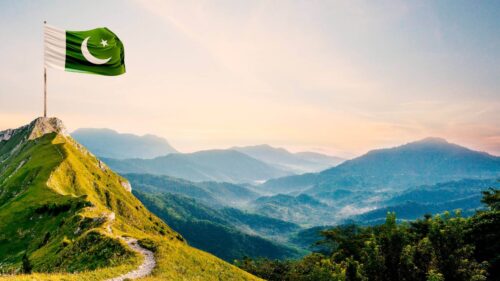Pakistan held a national election on February 8, 2024. Due to a legal debacle, many members of Former Prime Minister Imran Khan’s party, the Pakistan Tehreek-e-Insaf (PTI), contested as independents. The party wanted to use a cricket bat as their electoral symbol in support of their cricketer founder, but the Election Commission of Pakistan denied them. The General Headquarters of the Pakistan Army (GHQ) oversaw this decision.
PTI-supported candidates netted a large number of seats. At time of recording, they had won 102 seats in parliament (now 93). The number of seats required to form a majority is 169. Former Prime Minister Nawaz Sharif’s Pakistan Muslim League (PML) had won 73 (now 75). Former Foreign Minister Bilawal Bhutto Zardari’s Pakistan People’s Party (PPP) had won 54. The Jamaat-e-Islami ideological party, which has always pushed the Islamist agenda, lost all its seats.
Everything that occurs in Pakistan’s political scene does so under the watch of the corrupt GHQ. Was this election rigged? And can we expect from the new administration?
Is conspiracy at play?
In a fair election, the PTI would be the clear winner. The people overwhelmingly support Khan, seeing him as a challenger of the corrupt establishment. The public has lost faith in their irresponsible government and rejected radical parties.
Many voters believe the election was rigged. If it was, then it was done skillfully. The GHQ did not let the PTI take the majority of seats, which likely would have happened in a fair election. They afforded them less than a majority.
In Pakistan’s electoral process, the initial vote is counted and signed on a paper called Form 45 and the final vote on Form 47. Voters allege the signed document here was quite different from the final result. Thus, many cases are going to the Court of Appeals to contest the result.
Some people believe this situation is a shadow game between the US and China; that Khan is backed by China and the GHQ is following the US. As the expression goes, “Allah, Army and America” have guided Pakistan since independence.
This conspiracy theory may have some merit. While Khan was in power, he did not promote the China–Pakistan Economic Corridor Sharif had negotiated. There is no evidence linking Khan to China, as he has never strongly favored them but he certainly favors Beijing over Washington, DC.
Pakistan’s dire situation
Rampant corruption is only one of Pakistan’s terrible problems. The country is politically dysfunctional and economically broken. Employment is scarce, demoralizing young Pakistanis and making them seek opportunities elsewhere. Pakistan has bad relations with neighboring India and Afghanistan, as they have had years of conflict and cross-border terrorism.
To escape their economic crisis, Pakistan has once again gone to the International Monetary Fund (IMF) for support. Thanks to their history as a frontline state in the Cold War, they will not get much funding from the IMF or the US. China’s debt relief may only be available in small doses, as their own economy is suffering under President Xi Jinping.
Because the government has failed to provide for its people, religiosity and radicalization are increasing across the nation. This opposition, surprisingly, is overwhelmingly coming from Punjabis. In many ways, Pakistan is basically Punjabian — the army, bureaucracy and business class are filled with people from the Punjab region of eastern Pakistan and northwestern India.
Pakistani youths are tired of corruption and want the government to improve the country's standing with India. In fact, a recent poll found that 69% of Pakistani youths aged 18-34 favor better relations with India.
Imran, Nawaz and Bilawal
The GHQ opposes Imran Khan. The Muslim playboy and retired cricket champion was once their golden boy. That changed when he gained power in 2018, as he began questioning their orders. In June 2019, then-Director-General of Inter-Services Intelligence (ISI), Asim Munir, presented Khan with proof of his wife’s corruption. Khan responded pettily by removing him from service and refusing to promote him. For this offense, the GHQ sought his removal.
In March 2022, Pakistani and US diplomats held a meeting. Khan took a secretive cipher document from this meeting and waved it in a public forum, claiming it was proof of a conspiracy against him. This illegal disclosure of state secrets was just one of his misdeeds; he had also abused his power to get private gains from public gifts and married Bushra Bibi against Islamic law. In October 2023, Khan was sentenced to 24 years in prison, and Bibi received 14.
Times and public opinion change. In 2018, then-Prime Minister Nawaz Sharif was an unpopular politician who could not do anything right. Now he and Bilawal Bhutto Zardari, son of the late prime minister Benazir Bhutto, are back in the public’s good graces.
Pakistan’s future
The next prime minister, whoever that may be, will determine Pakistan’s future. The nation’s new darling, Bhutto Zardari, was highly critical of India, calling their prime minister the “Butcher of Gujarat.” Yet the GHQ brought back Sharif, who wants to improve relations with India. A cabinet with both politicians would be incongruous. Are the GHQ for or against India?
If Pakistan is to correct itself, it must construct a coalition and have a civilian government stabilize the country. If Nawaz becomes the prime minister, he and his family may be able to effectively fix the economy. He will likely try to initiate regular trade with India.
As people say, the GHQ's motto is “lose all wars but win all elections.” Pakistan’s hatred of India will not improve their economy. Someone in charge needs the courage to decide the state’s best interest — Indian trade is the correct answer. If the new government can get past their hostility, Pakistan might get a sorely needed change. Ending violence against Afghanistan and building trust with them would be another move toward prosperity.
Pakistan’s hyper-Islamic ideology is not enough to support its people’s needs. Once the new prime minister is chosen, we will have to see if a popular resistance movement emerges or another crisis erupts.
[Lee Thompson-Kolar wrote the first draft of this piece.]
The views expressed in this article/video are the author’s own and do not necessarily reflect Fair Observer’s editorial policy.










































Comment